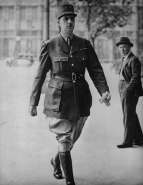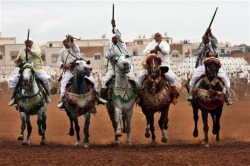Class Homepage Home Page
Algeria: Indigenous Ethnic Groups
Chris Deaver
World History-Hjelmgren
5/22/09
Algeria: Indigenous Ethnic Groups
The first ethnic tribe to settle in Algeria was the Berber tribes. Today we can still see evidence of their existence thousands of years ago. Numerous cave drawings of hunting and gathering have been set in stone in Tassili N’ajjer in Algeria (Algeria: Overview). They ruled the interior of Africa for decades and still remain today. By 12th century BC, Carthage took over the western coastline of Algeria for trade purposes (Algeria: Overview). While they controlled western Algeria, Masinissa, the Roman king who was victorious in the second Punic war, united northern Algeria (Algeria: Overview). Carthage fell after Masinissa’s army took back the coastline. Rome then had control of the western coastline of Algeria while the Berbers still controlled the interior (Algeria: Overview). By 440 AD, the Romans were taken over by the Vandals. The Vandals only ruled until Muslim forces took over in 650 AD (Algeria: Overview). After the Muslims came to control, the Berbers converted to Islam. Today we see the population in Algeria as 99% Arab/Berber (Algeria: Overview).
Algeria was located right in the center of the slave trade. Algeria struggled during this time because the European pirates kidnapped most slaves being shipped out of Algeria (History: To the Early Nineteenth Century). Slaves were often traded for key resources such as salt and gold. When the slave trade was interrupted, Algeria lost these valuable resources. The imports couldn’t reach Algeria without being taken away by the pirates. Algeria’s other exports such as wheat, fruit, and woven materials were also never shipped past the coastline (History: To the Early Nineteenth Century).
European colonization also put Algeria through a hardship. Europe took over most of Algeria’s farmable land and trade ports. This led to food shortages and trade was halted. Although Algeria was eventually put under financial autonomy, a European governor was in control (History: To the Early Nineteenth Century). This meant that Europe controlled the government and economy in Algeria. The Europeans later modernized the city to use it to their advantage; roads, railroads, schools, and hospitals were built all under Europe’s control (History: To the Early Nineteenth Century). The people of Algeria benefited slightly due to the modernization, but they gave up their freedom and rights to Europe. Today, Europe doesn’t rule over Algeria. In fact only 1% of Algeria’s population is European (History: To the Early Nineteenth Century). The Berber groups still spread culture all over Algeria. There hasn’t been any warfare in the country in the past decades because there is clearly one predominate ethnic group: the Arabs.
There have been many people who have impacted Algeria. Masinissa, for example, united northern Algeria and led to the victory against Carthage. Another person of impact was Charles de Gaulle. In 1962, he declared Algeria an independent state giving freedom to the Algerian people (“Ahmed Ben Bella”). Soon after in 1963, Ahmed Ben Bella became the first president for Algeria (“Ahmed Ben Bellal”). He made many important changes in the country. He very quickly became aware of racial discrimination and also led the country to a nationalist government. Overall, Algeria and its people have benefited from these men.
Class Homepage Home Page
Title.
“Ahmed Ben Bella.” Encyclopedia Britannica. 2009. Encyclopedia Britannica Online. 03 May. 2009 http://www.britannica.com/EBchecked/topic/0289/Ahmed-Ben Bella.
This website was great! it was very organized and helped me find vital information about Ahmed Ben Bella.
"Algeria: Country Overview." World Geography. 2009. ABC-CLIO. 4 May
2009<http://www.worldgeography.abc-clio.com>.
This website was a “gold mine.” I found most of my research here as well as a great picture. Everything was easy to find and organized nicely. I really recommend this website!
“To the Early Nineteenth Century.” The Columbia Electronic Encyclopedia.
2007. 29 Apr. 2009. http://www.infoplease.com/ce6/world/A0856564.html
This website helped me find information about the effects of the slave trade on Algeria.
This website was great! it was very organized and helped me find vital information about Ahmed Ben Bella.
"Algeria: Country Overview." World Geography. 2009. ABC-CLIO. 4 May
2009<http://www.worldgeography.abc-clio.com>.
This website was a “gold mine.” I found most of my research here as well as a great picture. Everything was easy to find and organized nicely. I really recommend this website!
“To the Early Nineteenth Century.” The Columbia Electronic Encyclopedia.
2007. 29 Apr. 2009. http://www.infoplease.com/ce6/world/A0856564.html
This website helped me find information about the effects of the slave trade on Algeria.
Last updated on May 22, 2009, by Chris Deaver


